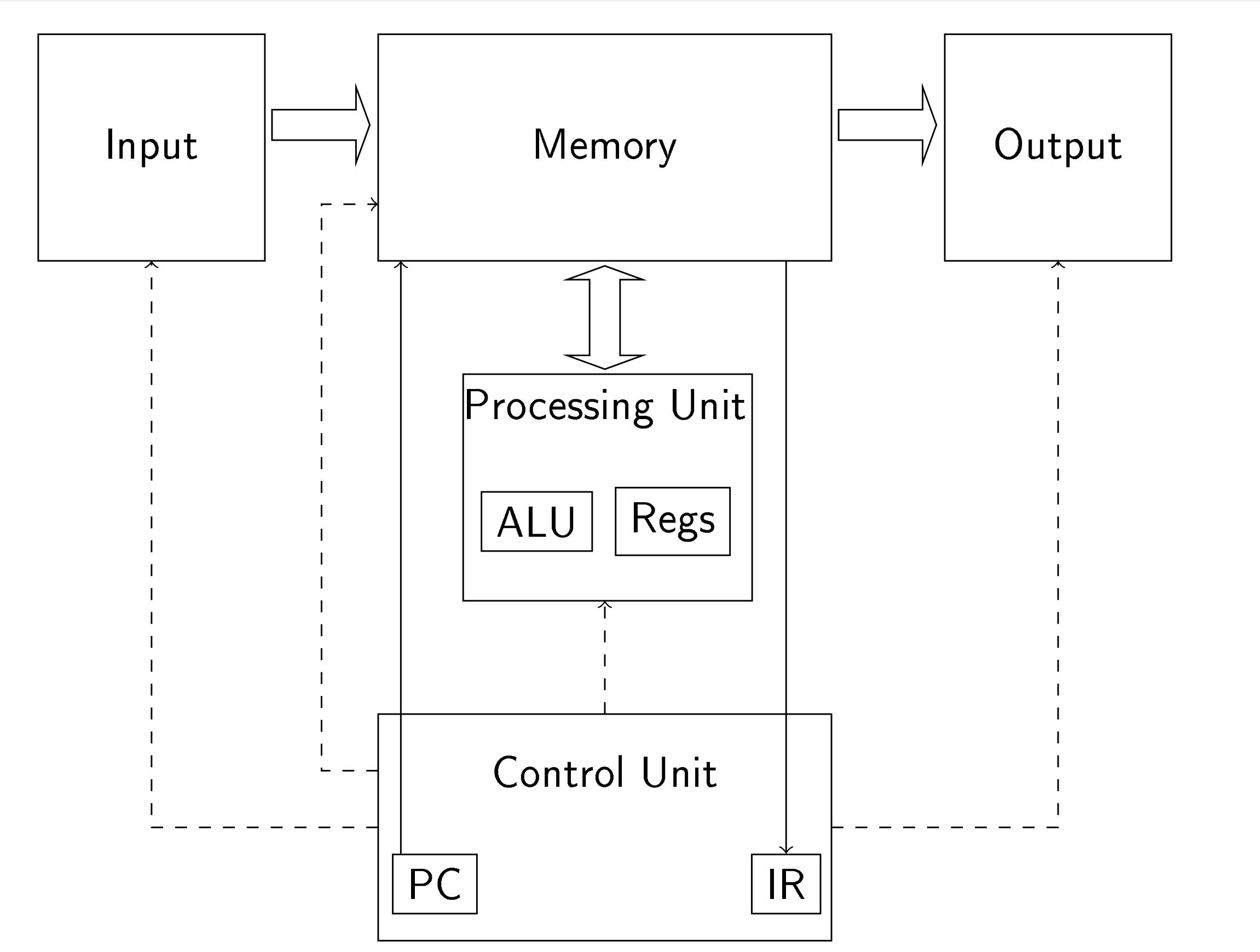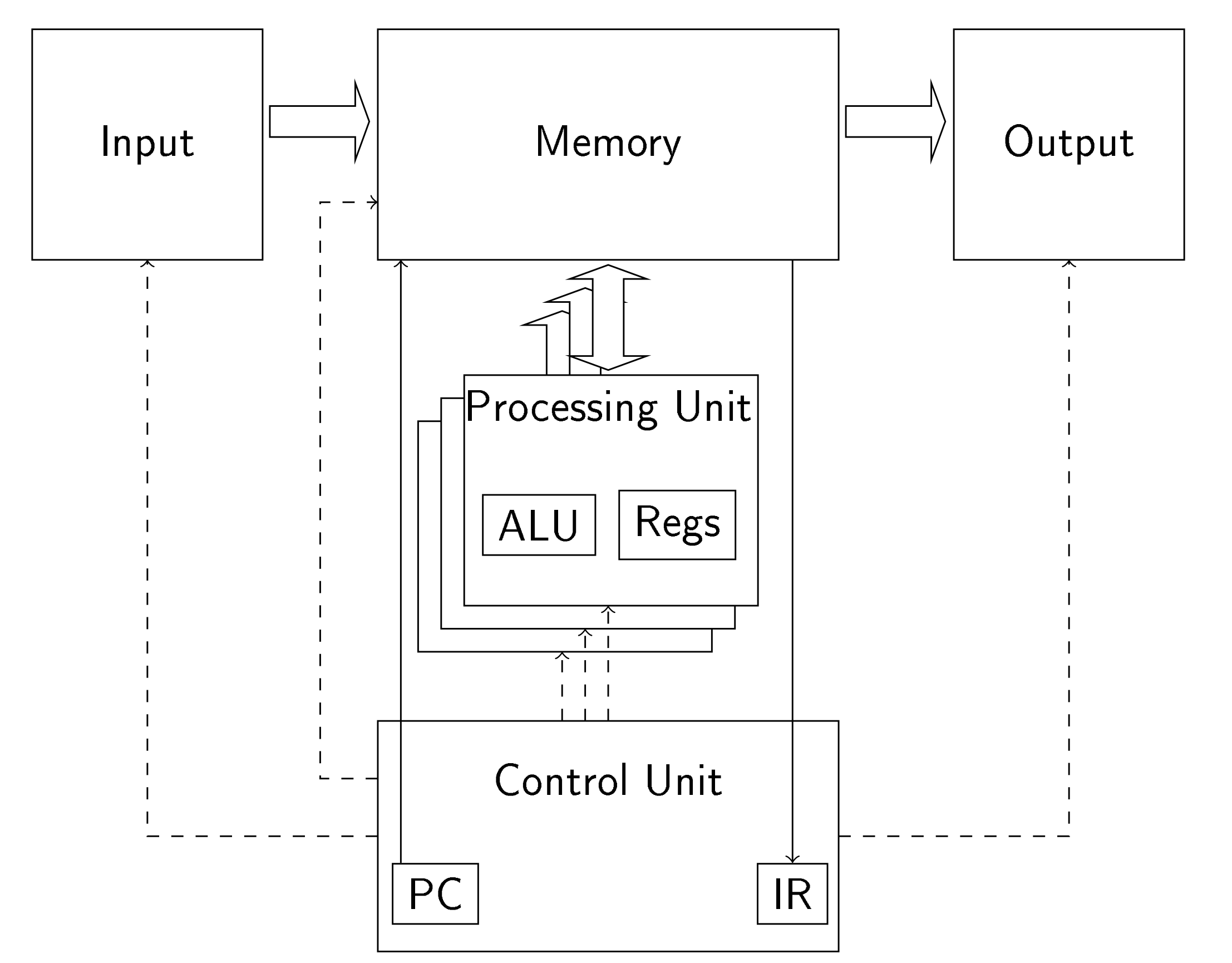Lecture 7
2 Types of Parallelism
- Task based
- e.g. multiply or add
- suitable for standard multi-core CPUs or networks of computers
- i.e. have the same code running on multiple cores or CPUs
- Data based
- e.g. alter an image by performing hte same operation on each pixel in parallel
- Suitable for GPUs
Latency vs. Throughput
-
Latency oriented processors
- Minimises delay on first result being returned
- e.g. if an operation takes 4 cycles, 10 operations will take 40 cycles
- Large Caches to speed up memory access
- Temporal/ Spacial locality, working sets
- Complex control units
- Short pipelines, branch prediction, data forwarding
- to prevent pipeline stalls
- Short pipelines, branch prediction, data forwarding
- Complex, energy expensive ALUs
- To minimise cycles to return a result.
-
Throughput oriented processors
- Minimises delay on all results being returned
- e.g. implement pipelined operation on ALUs, 10 cycles for first operation and to fill the pipeline but 1 cycles for all subsqeuent operations, total 19 cycles
- Small caches
- For staging data
- get blocks of data at one time for a group of threads to work on
- avoids each thread making separate fetches
- For staging data
- Simple control units
- No branch predction or data forwarding
- The control is shared between threads working on different data
- Simple, energy efficient ALU
- Long pipelines
- Large number of cycles per operation but heavily pipelined
- long wait for first result as pipeline needs to be filled
- but following results come quickly
- Required large amount of threads to keep processor occupied
- long wait for first result as pipeline needs to be filled
Fig. 1. Von Neumann Architecture

Fig. 2. Von Neumann Architecture for GPU

Compiling for CUDA
- The host CPU and GPU are separate devices connected by a bus
- Each have separate memory
- Therefore, we need to generate separate code for each device
- The nvidia compiler for CUDA programs is
nvcc
- The nvidia compiler for CUDA programs is
nvcctakes C/C++ code for with Nvidia extensions, separates and compiles the GPU code and passes the CPU code to the host to be compiled- This results in a single binary with both CPU and GPU code, the GPU code is loaded onto it when the host runs this.
VectorAdd - trivial example
The sequential code for this may look like this:
void vecAdd(float* h_A, float* h_B, float* h_C, int n){ for (i=0; i<n ; i++){ h_C[i] = h_A[i] + h_B[i]; } } int main(){ // declarations vecAdd(h_A,h_B, h_C, N); ... }
To write this for CUDA we must identify whether a function runs on the host, the device or both.
We also have to work out where it should be callable from:
- the host:
__host__ void f(...)- This is default so can be omitted
- Callable from the host only
- The device:
__global__ void f(...)- special functions called kernel functions
- callable from host only. This is how we run code on the GPU
- The device:
__device__ void f(...)- callable from the device only. they are helper functions
- both:
__host__ __device__ void f(...)
CPU computational unit structure
- When we call a kernel function we need to specify how the threads should be organised to execute it
- Every thread is going to exectue the same kernel.
- Different CPU devices can support different numbers of simultaneously executable threads
- Within a GPU thread structure is not uniform, i.e. do not have equal access to all the GPU memory, syncronise with other processing units or share cache memory
CUDA thread issues
- We don't want the fixed number of GPU threads to dictate the size of the largest vectors we can add
- We don't want to have to change our code to run on different GPUs
- We need to organise our threads to co-locate groups of threads on sets of processing units to take advantage of shared caches and syncronisation facilities
- NVidia GPUs accomplish this by organising threads into a hierarchical structure
- A Grid is a collection of Blocks
- A Block is a collection of Threads
- A Thread is the execution of a kernel on a single processing unit
CUDA thread organisation
Outside the Grid/Block/THread hierarchy, there is the concept of a Warp
-
A Warp is a set of a number of tightly related threads that must execute fully in lock step with each other.
-
Warps are not part of CUDA but are on all modern Nvidia GPUs, dictated by low level hardware design
-
The number of threads in a warp is a feature of a particular GPU, but is most commonly 32
-
Warps are the low-level basis of thread scheduling on a GPU, if a thread is scheduled to execute, so are all other threads in the warp
-
As they execute the same instructions in lock step, all threads in a warp will have the same instruction timing
-
A block can have a size between 1 and the number of threads on the GPU. (typically 2014) and is the high-level basis of thread scheduling
-
Because of the nature of warps, the block size should be a multiple of the warp size
-
Grids can have large numbers of blocks, many more than can be concurrently executed.
Invoking Kernel Functions
- We need to specify the grid/block structure hwen invoking a kernel function
... int threadsPerBlock = 256; int blocksPerGrid = 1 + (numElements - 1) / threadsPerBlock; vectorAdd<<<blocksPerGrid, threadsPerBlock >>>(d_A, d_B, d_C, numElements); ...
Note <<<blocksPerGrid, threadsPerBlock >>> is not standard C/C++ and is handled by nvcc
Inside Kernel Functions
Each thread needs to know which part of the data to work on.
CUDA provides predefined variables for this purpose:
blockIdx.xthe unique identifier for this block in this gridblockDim.xthe number of threads in a block for this gridthreadIdx.xthe unique identifier of this thread in this block
__global__ void vectorAdd(const float *A, const float *B, float *C, int n){ int i = blockDim.x * blockIdx.x + threadIdx.x; if (i < n){ C[i] = A[i] + B[i]; } }
Grid and Block Dimensionalities
- Grids and Blocks can be organised as 1D, 2D or 3D spaces
- Hence the predefined variables
blockIdx.x, blockDim.x, threadIdx.xhave.yand.zvariants- If you are using 1D grids and blocks then you can ignore these.
Device Global Memory
- GPU memory is not shared with the host. Therefore, the host has to copy data to the device and copy s back when the kernel finishes.
- Before doing this, the host must allocate global memory on the device and, afterwards, free it again, like
mallocandfree.- Note: the return of
cudaMallocis an error number
- Note: the return of
float *h_A = (float *)malloc(size); float *h_B = (float *)malloc(size); float *d_A = NULL; err = cudaMalloc((void **)&d_A, size); float *d_C = NULL; err = cudaMalloc((void **)&d_C, size); ... err = cudaMemcpy(d_A,h_A, size, cudaMemcpyHostToDevice); ... // Invoke kernel err = cudaMemcpy(h_c,d_C, size, cudaMemcpyDeviceToHost); ... err = cudaFree(d_A); err = cudaFree(d_C);
Note: this code is for a slightly different example, use it only as an example of cuda<method> methods
CUDA Error Handling
The only way to check hat things are working correctly on the GPU is the check the error return values. Check them every time
if (err != cudaSuccess){ // handler }
- Kernel functions don't return error numbers. However, after it has finished you can call
err = cudaGetLastError();to get the error number if one occurred. - Since kernel functions can run in parallel with host functions, if ou call
cudaGetLastError()before the kernel function finishes, the rror may only occur after you requested the error. - If you really want to avoid this call
cudaDeviceSyncronize()- But avoid this as it is very inefficient.
TIming Host Code with Host Timers
-
Typically we want to time both the sequential code (on the host) and the parallel code (on the GPU).
-
The general approach to time the Host code is:
# include <cuda_runtime.h> # include <helper_cuda.h> # include <helper_functions.h> StopWatchInterface *timer = NULL; sdkCreateTimer(&timer); sdkStartTimer(&timer); /* The Host code that is to be timed*/ sdkStopTimer(&timer); double h_msecs = sdkGetTimerValue(&timer); sdkDeleteTimer(&timer);
- In general do NOT use host timers to time GPU code. They are much less accurate.
- However, if you have to time the Host and GPU code using host timers the pattern is:
# include <cuda_runtime.h> # include <helper_cuda.h> # include <helper_functions.h> StopWatchInterface *timer = NULL; sdkCreateTimer(&timer); sdkStartTimer(&timer); /* Host + GPU code that is to be timed */ cudaDeviceSyncronize(); sdkStopTimer(&timer); double h_msecs = sdkGetTimerValue(&timer); sdkDeleteTimter(&timer);
- The best way to time GPU code is to insert an event into the GPU execution stream before and after the code to time and get the elapsed time from them.
cudaEvent_t start, stop; float m_secs; cudaEventCreate(&start); cudaEventCreate(&stop); cudaEventRecord(start ,0); /* Call GPU kernel(s) */ cudaEventRecord(stop, 0); cudaEventSyncronize(stop); cudaEventElapsedTime(&d_msecs, start, stop); cudaEventDestroy(start); cudaEventDestroy(stop);